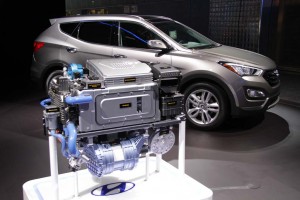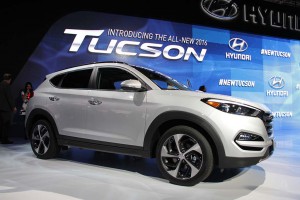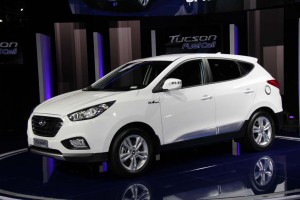
The Hyundai fuel cell stack shown in front of the Tucson. The entire package fits under the hood where a gas engine would normally go.
A lack of a hydrogen fueling network is taking its toll on Hyundai’s fuel cell-powered Tucson model, according to the maker’s top U.S. executive.
That has forced the maker to turn away potential buyers who simply don’t live close enough to the handful of hydrogen pumps currently open to the public in Southern California. But Dave Zuchowski, CEO of Hyundai Motor America said the situation should improve over the next few years as a state-funded effort opens more hydrogen fueling stations.
Hyundai has sold “under 100” of the Tucson FCV models since the fuel-cell vehicle was introduced last summer, said Zuchowski, during a chat with reporters following a drive of two of the maker’s other alternative-power vehicles, the Sonata Hybrid and Plug-in Hybrid models.
That’s not for a lack of interest, he and other Hyundai officials stressed. The Tucson FCV has generated significant interest since it went on sale nearly a year ago, but while there might be a reasonable bit of demand, Hyundai has been cautious about who it actually wants to sell the vehicle to.
(Hyundai expects to give go to Santa Cruz pickup and new subcompact crossover. Click Here for that breaking story.)
The key issue is ensuring that a customer can readily fill up the fuel-cell vehicle’s tank. That can be a challenge when there are only about a half-dozen hydrogen stations in the Southern California region where the vehicle is currently being sold.
On the positive side, the State of California has set aside millions of dollars to expand that nascent hydrogen infrastructure and expects to have nearly a dozen filling stations open in the coming year, with a target of doubling that in short order. Eventually, the state hopes to have at least 100 in place.
The government-funded initiative is meant to upend the classic chicken-and-egg syndrome. The energy industry doesn’t want to invest in hydrogen unless and until sales of fuel-cell vehicles hit critical mass. Automakers are reluctant to commit to manufacturing hydrogen vehicles if there’s no place to fill them up.
(Hyundai Santa Cruz concept asks: when is a truck not a truck, Click Here for more.)
Seen by many as the fuel of the future, hydrogen is typically used in a fuel-cell stack. The gas is pushed through a permeable membrane coated with rare metals like platinum, combining with oxygen on the other side. The process creates a flow of electric current – and water vapor as its exhaust. That energy is used to power electric motors similar to those in a battery-car.

Hyundai has not said if - or when - the fuel-cell model will adopt the new Tucson body coming for 2016 with gas-powered models.
Many proponents believe hydrogen cars could eventually outsell battery-electric vehicles. For one thing, they can offer up to 300 miles of range on a tankful of the lightweight gas. And refueling can be accomplished in a matter of minutes, compared to the hours typically needed to recharge a battery-car.
For now, though, Hyundai thoroughly vets each potential Tucson FCV customers to see if they’re living where the fuel is available. The carmaker will keep track of other interested motorists and advise them once the refueling network expands into their areas, Hyundai officials noted.
(Click Here to check out the new 2016 Hyundai Tucson SUV.)
There are other challenges, said Zuchowski. As with gasoline, hydrogen supplies can be contaminated if not handled properly. That happened recently with the fuel sent to one of the existing service stations, in turn creating problems similar to what happens when a car is filled with bad gas.
The maker had to repair a small number of the Tucson FCVs but there was no significant damage to any of the mechanical components.
Hyundai is currently the only automaker selling a fuel-cell vehicle to retail customers in the U.S. Toyota, however, is preparing to launch its own hydrogen car, the Mirai, in the coming weeks. Honda, which offered a limited lease program for the old FCX model a few years back, plans to get back into the hydrogen market in 2016 with a new model of its own.
Other manufacturers, including Mercedes-Benz and General Motors, are currently field testing small numbers of hydrogen vehicles and could bring them out to the retail market before the end of the decade, company officials have suggested.


Auto makers will need to make deals with gas stations/the oil Cartel/Cabal to build a network of hydrogen refueling stations. The government should NOT be building hydrogen refueling stations nor battery recharging or exchange stations for EVs.
In Germany you can readily buy propane and CNG at many petrol stations. There is no reason why private enterprise can’t build the necessary infrastructure required as hydrogen appears to have a brighter future than battery powered vehicles.